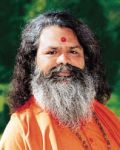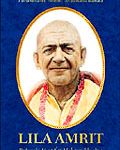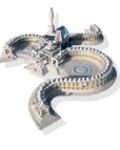Mahaprabhuji's Mahasamadhi
In March 1963, while staying in Sabarmati Ashram in Ahmedabad, I received a letter from Mahaprabhuji saying that I should come to him as soon as possible and to bring with me cotton cloth for a meditation shawl. I was very happy to have the opportunity to fulfil his wish, as Mahaprabhuji had never asked me for anything. One of my disciples Dr. N. D. Bhatt, asked if he could donate the material for the shawl for Mahaprabhuji and he obtained enough cotton to make a whole robe. Together we then travelled on to Khatu. We arrived at the ashram on the festive day of Holi and with much joy we greeted Mahaprabhuji, who blessed us and thanked us for the gift.
It is here that I would like to include the story of King Hiranakashyap in relation to the well-known Indian festival of Holi.
King Hiranakashyap had practised strict asceticism for a long time and he prayed to be granted a siddhi. One day he succeeded and a Divine voice sounded from heaven.
"What is your desire, O king?"
King Hiranakashyap's greatest longing was like the longing of many people — he wished for immortality. To the Divine voice he made a carefully worded request.
"It is my wish that death should not touch me, either by day or night, neither in my house nor outside, neither by human nor animal, nor by any weapon."
"Your wish shall be granted," the voice answered.
Thinking that he was now immortal, the king let his arrogance grow without bounds and he did not stop even before God.
"I am God," he maintained. "There is no other God but me!"
He ordered his subjects to worship him as God. Prayers and devotions dedicated to any other God were made punishable by death. To enforce compliance with these instructions, the king himself travelled throughout the land.
On one of these sojourns he met an old woman who was sitting in front of a kiln calling on God's name in her despair.
"How dare you!" the king shouted angrily at her. "This name is of no use to you. Only I can give you what you want, for I am God and there exists no other God but me!"
Trembling with fear, the old woman told him her story.
"Take pity on me, O Lord, and hear me out before I am sentenced. I made some earthen pots and wished to fire them in the kiln, but before putting them in the kiln I left them to dry. In the meantime a cat crept inside one and gave birth to four young. By an unfortunate mistake I also placed that pot in the fire and now I plead to God either to rescue the lives of the cats or relieve me from the guilt of their death."
"Now it shall be proven what your prayer can do," King Hiranakashyap said with a scornful smile. "I shall wait until your pots are ready and if the cats are not alive, you will also die through fire!"
All night the poor woman desperately prayed for God's help. In the afternoon of the next day when the fire had burnt out, she began to clear away the ashes with trembling hands. And what did she see? In four of the jugs was soft green grass and in it the cats were playing, jumping from one pot to the other!
"Praise be to God!" the woman shouted gratefully and without a word the king mounted his horse and rode off.
King Hiranakashyap had a highly spiritually developed son called Prahlad, who even as a small child, prayed to God and of this his father greatly disapproved. Again and again the king would punish Prahlad for his prayers, but the boy couldn't be dissuaded from repeating the name of God, regardless of his father's threats or mistreatment. This infuriated the king so much that on several occasions he even tried to kill his son.
Once he ordered that the boy be thrown into the sea at a place known to have many sharks. The king also abandoned him in the jungle, surrounded by a herd of wild elephants. He even pushed his son off high rocks but each time Prahlad was mysteriously saved and returned home unhurt.
The king had a sister named Holika who possessed the exceptional siddhi of remaining unscathed by fire. One day the king ordered her to take the child and sit in the middle of a burning pile of wood, but another miracle happened: the king's sister was burnt to ashes but the child remained unscathed.
In a further effort to be rid of his son, the king erected an iron column in the courtyard of his palace and in its hollow frame lit a fire until the column glowed red with intense heat. Before sunset the king called his son to him.
"If you maintain that God is everywhere, then go there and embrace God in the form of this column."
Prahlad had complete trust in God the Omnipotent and knew that if it was His wish, he would survive. Bravely he walked towards the red-hot column and, on nearing it, realized to his surprise that the red colour was not due to the heat, but was from millions of little red ants that ran up and down it.
"These little ants won't harm me," he thought and so gladly stretched out his arms to embrace the column.
But in this moment the iron column split open and an enormous creature emerged. Its head and trunk were like that of a lion and from the navel to its feet it was of human form.
The creature embraced the child.
"My son, you have suffered enough!"
Thereupon it turned to the frightened king, who was trying to escape. The creature pursued the king and captured him exactly at the threshold of the palace door. The king was flung to the ground and pinned there.
"Tell me, are you inside or outside your home?" roared the creature in a thunderous voice.
Trembling, the king replied, "Neither, nor."
"Is it day or night?" the creature demanded.
"Neither, nor," the king again replied, for the sun was equally above and below the horizon.
"Am I animal or man?" continued the creature.
"You are neither!" the king shouted in panic.
The lion-creature, the Godhead Nar-Singh, showed his terrible claws and questioned, "Are these weapons?"
The king had to admit that they were not.
"So, by your wish all your conditions have been met and now the hour of your death has come," the creature bellowed and with that, Nar-Singh tore the wicked king to pieces.
The boy Prahlad became a great hero and a king who ruled his subjects with wisdom and devotion.
It is on the festival of Holi in India that all are reminded of the king's sister, Holika. At the end of February, two trees are placed in the centre of the village. The bigger one is to symbolise Holika and the smaller one Prahlad. For one month the villagers celebrate with dance and song and at the end of the month, on the day of the full moon, the tree of Holika is set alight. Sweets are distributed and it is custom to paint oneself and others with bright colours to express joy of the victory of good over evil.
Now let us return again to the events of Khatu in the year of 1963.
At an early hour on the morning after our arrival, Mahaprabhuji called me to his room and spoke the words I have already quoted in the preface of this book, revealing that he would leave the world ten months hence, on the day of Pausha Krishna Chaturti, December 5, 1963, at five o'clock in the morning.
As I was unwilling to believe this announcement, he urged, "Tell me, what is your greatest wish so that later on you may not regret having missed this opportunity."
Eventually I said a prayer and then spoke, "Holy Master, I ask just for one thing, that my concentration be directed only to you at any place, at any time. That all your devotees be blessed and led in your omnipotence to achieve brahmananda (Divine bliss). I wish for millions of people to live by your blessing so that the world's suffering will be relieved."
Mahaprabhuji laid his hand upon my head in blessing.
"My son, the light of my true form shall always be with you. Anywhere, at any time, you are protected by me. Whatever you wish will be fulfilled."
I then repeated my already often expressed request to be permitted to write his life story and this time he agreed. I was immensely happy about this but, on the other hand, was deeply worried and confused by the announcement of his impending departure from this world.
Mahaprabhuji knew the state of my mind.
"Whenever there are devotees who concentrate on me, I will be there, ready to help them. You don't believe what I am telling you today, but you know that I always speak the truth. Prepare yourself, for I will leave this body just as I have said."
When I left him I was very sad and still could not truly convince myself that what he said would actually come to pass. I said goodbye to him and now, when I think back on his words, I deeply regret not having paid heed to them.
Even two years before his departure he had told some disciples in order to prepare them, but none wanted to believe it. In my thoughts I always had in mind that I would leave this world before Mahaprabhuji, or at least at the same time and in this way I'd be spared the pain of living without him. However, destiny often determines things differently to what we would like.
Dr. Bhatt and I returned to Ahmedabad and during the next months I was very busy. I accepted an invitation to go to a palace which had been offered for my use. This palace was in the Pali district, high on a hill near Rani and it belonged to the former minister of the Maharaja, Dharma Narayan. There we celebrated many wonderful satsangs.
Six months later, Mahaprabhuji again reminded us of his impending departure and two months before the predicted date, he announced the place where his monument of samadhi should be built. Numerous people gathered at the ashram in Khatu, where every day now Mahaprabhuji held satsang.
One of his close disciples, an Ayurvedic doctor named Vaidya Asha Ram, did not believe Mahaprabhuji would leave the world so soon. Vaidya Asha Ram said that Gurudeva looked much too healthy and happy to die, so therefore on December 4th he requested Mahaprabhuji that he be allowed to return home to continue his work.
"Asha Ram, tomorrow I will leave here. Stay until then," Mahaprabhuji said to him.
However, still Asha Ram and many other disciples didn't believe him and thought that Gurudeva was just playing one of his Divine Lilas, so they left the ashram. This is something they still regret.
In these days Mahaprabhuji was like a victorious king. Light surrounded him and he looked vibrant and young, although he was 135 years of age.
In my room in Rani, at four o'clock on the morning of December 5, 1963, I had a vision of Mahaprabhuji during my meditation in which he placed his hand on my head.
"Today I go to satya loka[1],” he said with a smile. “Look, four messengers have come to accompany me. They stand behind you."
When I looked around I saw four devas with the appearance of Lord Vishnu, bowing reverently with folded hands before Mahaprabhuji.
"Lord of the Universe, a great celebration is in preparation for your welcome. Everyone expects to see you and you are requested to set off without delay."
I was surprised to see Lord Vishnu in four persons at the same time and Mahaprabhuji then explained.
"These are not Vishnu himself, but only his messengers. In vishnu loka all inhabitants live like Lord Vishnu, in shiva loka like Lord Shiva, in brahma loka like Lord Brahma, in indra loka like Lord Indra and in deva loka like devas. The inhabitants of each level are like their Master."
An ornate throne, glittering like the Sun, decorated with sparkling pearls and gems, floated down towards Mahaprabhuji and he ascended ready to return to his divine home. Like a heavenly vehicle, the throne carried Mahaprabhuji together with the four messengers quickly through space,
The gandharvas (angels) praised Gurudeva with songs as he passed through their astral level. In deva loka (realm of the gods) he was welcomed by celestial dances and songs. In indra loka (heaven) Indra, the Lord of Gods, Dharma Raj (the king of dharma) and many others showered Mahaprabhuji with gifts.
His welcome in vishnu loka was splendid and Goddess Lakshmi Herself decorated Mahaprabhuji with the flower-mala. In shiva loka the welcome was different. Shiva performed the tandava dance[2] in his honour.
Thus Mahaprabhuji came to satya loka, which was brightly lit as if by a thousand Suns, although there shines neither Sun or Moon. Satya loka is filled with everlasting bliss — ananda. There exists no duality, like heat and cold, pain and joy, brightness and darkness. Only a single sound fills the whole space:
Om Satya Brahma Sri Deep Narayan Pari Puran Namaha
This sound also resonates on all other levels.
In my meditation I was outside my physical consciousness and was witness to all these scenes. However, in one moment the visions disappeared and again I was back in my normal state of awareness. The whole day I thought of this vision.
On Wednesday, December 5th, 1963, a morning satsang was held as usual in the Sri Deva Dungary Sannyas Ashram and Mahaprabhuji gave prasad to everyone.
Ten minutes before five o'clock he spoke to those present.
"My dears, in case you still have any wishes, tell me now for soon I will say goodbye to you."
For some moments there was silence. Then came the only question from all present.
"Master! Are you leaving us alone here?"
Mahaprabhuji's words blessed them.
"Don't be afraid! You are with me always and I am with you. Whenever my devotees think of me I will be present, no matter what country, what place, what year it is.
"My soul is indestructible and immortal. Only the physical body is mortal, since it is made of the five elements. This is an unchangeable, natural law but you should know that I am always with you. Those devotees who are unable to be here with me today will also see me once more and I shall grant them their desires.
"Difficult times are approaching and the world will be influenced by destructive powers and disbelief. But you shall remain steadfast and never lose your path! Nothing belongs to you. Hold onto truth and always remember God."
After these words of farewell, at exactly five o'clock in the morning, Mahaprabhuji began to chant OM. Prana and apana united and rose towards brahma randhra[3].
Those present clearly heard the manifestation OM rise in Mahaprabhuji's body and then pass through the sahasrar chakra. His heart stopped beating and his body began to grow cold, but his face still radiated the Divine glow of his gentle smile. Such a samadhi is only possible with God-realized yogis.
The science of yoga is a valuable gift to humanity that goes far beyond the physical nature of things.
As Mahaprabhuji had promised, on the day of his samadhi he appeared to all those devotees who had been unable to come to Khatu.
Mahaprabhuji's body was buried some days later because hundreds of devotees wished to say their final farewell to his holy form. The body remained soft and natural-looking. Finally it was laid to rest according to tradition in the place previously chosen by Mahaprabhuji. Many yogis and swamis took part in this ceremony and for two weeks the faithful, who had gathered in crowds from all parts of India, chanted songs and prayer in his honour.
The magnificent monument of Mahaprabhuji, covered by a baldachin of marble, is located in the meditation hall of Sri Deva Dungary Sannyas Ashram at Khatu. Thousands of followers come to this holy place to receive his blessing and see where Mahaprabhuji lived and worked.
[1]satya loka = highest level of truth and reality
(satya = truth, loka = level)
[2]tandava dance = dance of Shiva as the destroyer of evil
[3]brahma randhra = "door of Brahman" another name for the sahasrar chakra, the thousand-petalled lotus, the seat of Divine Consciousness, the door of liberation. In a normal person the prana (vital energy) leaves the body at the moment of death through one of the nine "doors" (i.e., eyes, nose, mouth, ears, etc.). However, the soul of a realized yogi departs through the tenth door of liberation, the Divine door, which is located at the top of the head.
Next Chapter: Spreading Mahaprabhuji's teachings
Previous Chapter: Pilgrimage to the Himalayas
Overview: My life with Sri Mahaprabhuji








